#short and concise
Explore tagged Tumblr posts
Text
Something that peeves me whenever I see another post going around with some variation on "autistic people take things literally which means we are the only people who communicate Clearly and Directly" is that - for any given statement, there is not one singular, agreed on, universal Literal Interpretation. If there was, none of this would be a problem!
The nature of language is that there's always some degree of interpretability. Words have several different meanings, often overlapping, and there's nuance of context, cultural references, and so on.
Faced with a statement, most people will quickly come up with an interpretation that to them makes the most sense. But if you asked a roomful of people to explain in detail their interpretations, everyone's would probably be a little different, even for a pretty simple statement. Regardless of whether those people are autistic! Everyone conceptualizes the world a little differently, and everyone has a unique personal history of all the language they've encountered, and these things effect our interpretations.
In order for communication to be workable, given this slosh in interpretability, there's another couple of processes that go on. As conversation goes on, people reassess if their initial interpretation matches up with additional context. If it doesn't, they revise it, or ask clarifying questions. And on the flipside of this process, the other person in conversation is tracking if your reactions make sense with *their* understanding of what they're trying to convey to you, and offering context or rephrasing things if it seems you're out of alignment.
These processes are social skillsets that are, like most social skillsets, not ever directly articulated or explained. Many people are bad at one or both. Sometimes you encounter someone who is really, notably good at it - the vaunted "good listener", who puts in the effort to really understand what you're trying to say, or that really excellent teacher who engages with you back and forth until you really get it. But a lot of the time, it's a sort of passive social friction - people just not getting each other.
Sometimes, you encounter someone whose brain works so much like yours that talking to them feels almost effortless - you just get each other. But that's a pretty rare occurrence for anyone. More often, as you get to know someone, you start to understand the shape of the way they interpret things and learn to account for it, so over time it's easier to make sense to each other.
It's honestly not uncommon in society for people to aggregate in groups of people who interpret things similarly, and who are thus easier to talk to, rather than actually building the skills of communicating across interpretation gaps. Particularly egregious are those groups of men who talk about Women as an incomprehensible monolith, but it turns up to a greater or lesser degree on a lot of levels.
I suspect this is the root of a lot of parenting problems - people who have never built this communication skillset, and relied on choosing friends who make sense to them without a lot of effort, and who are then totally unprepared to interact with a child who interprets things in ways they don't expect.
Obviously I can't speak to The Universal Typical Experience, not least because it doesn't exist. But in general I would posit that:
Most people, give or take a few assholes, are not trying to say things that are confusing. Most people think they are communicating clearly, because the first interpretation *they* would come up with on hearing one of their own sentences is the correct interpretation.
Many people are not very good at accounting for different ways people could interpret things they're saying. However, it is normal and polite social behavior to be somewhat flexible about this and forgiving of misunderstandings. If people are being shitty to you about not understanding them, they are assholes. And I wouldn't assume that the rest of the communication they have with everyone else they know goes totally smoothly for them.
I suspect there is a bit of an unfortunate feedback loop, where people have bad experiences when someone gets mad at them for not getting something, and learn to hide when they're confused. Which then leads to larger, more complicated misunderstandings, which other different people get upset at them about, because those people think they should have asked for clarification in the first place.
Truly you can't win with everyone. No one can win with everyone. There is no monolith of "neurotypical communication" which resolves all these contradictions - all those people you're lumping in together under "neurotypical" have just as much trouble with each other.
#this post brought to you by: the irony of people in the notes of a post about Literal Direct Communication arguing about#what would be a clearer and more unambiguous way to express the sentiment meant by 'autistic people take things literally'#'no *your* phrasing is even *more* confusing it should be -' do you see the problem yet perhaps#Look. If someone says 'I'm the only person who communicates Clearly and everyone else is the problem'#what I hear is 'I have no ability whatsoever to account for other ways people might be interpreting things differently from me'#This is all pretty longwinded. I might try to revise down a more concise version.#Concise is hard for me; that's something I'm working on#I just took out a paragraph about literal vs figurative language because it was clunking things up#But the long and short of it is that those aren't as clearly seperable as people sometimes claim#For one thing I often see 'literal speech' used to mean 'i think the interpretation is obvious' which is sure. A tautology.#anyway sorry for my rambling slash thank you for reading it#long post
2K notes
·
View notes
Text
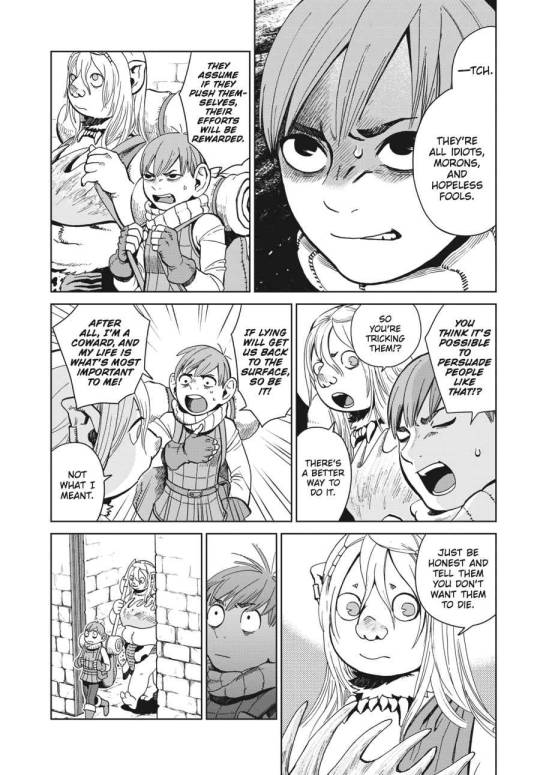
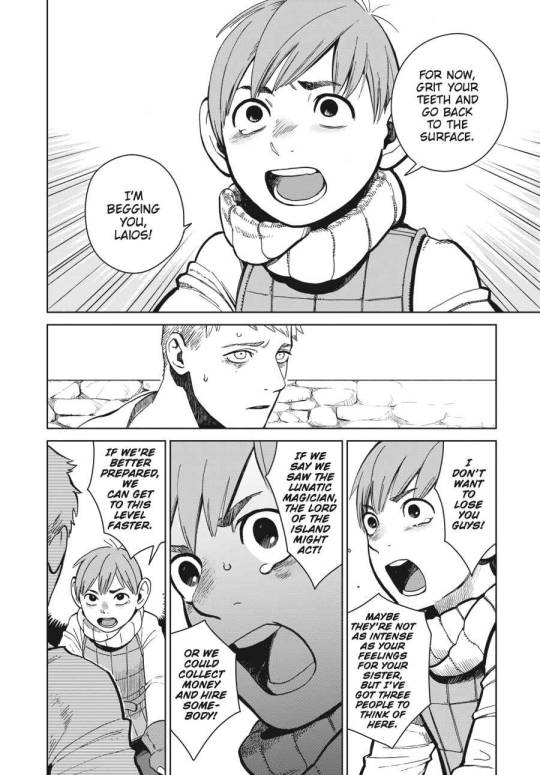
Chilchuck analysis speedrun: As a hardworking half-foot who grew up poor and discriminated against and had his gullibility taken advantage of multiple times in his early adventuring days, Chilchuck thinks optimism is a dangerous flaw. He’s stressed and strict all the time because his job is noticing details like traps that could get everyone killed before anyone knows it, he takes the lives of everyone to be on his shoulders, and with the way he speaks about it that probably partly reflects how he felt about taking it upon himself to provide for his family too. His life’s always been pretty centered around work and has become even moreso now that his wife left and everyone is independent, and due to past events he’s very iffy with bonding with coworkers. He thinks feelings and job are a disaster mix. Like with his wife or with parties hiring him as sacrifice, being open or having good faith is vulnerability which can get you hurt, so he processes and shows all his stress as anger instead of worry. Doing strict dieting probably isn’t helping the irritability what with hunger, and on top of being a hunger suppressant alcohol might be the main stress reliever he has.
His grey hairs are so earned
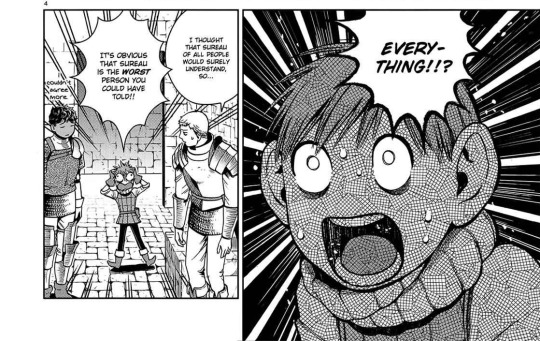

#Chilchuck tims#dungeon meshi#analysis#HAPPY CHILCHUCK DAY#You know what yeah understandable have a good day#Alcohol be a ticket straight to chilling out town I suppose#Spoilers#dungeon meshi manga spoilers#Thinking on if I should split my family masterpost into diff posts for max reach hmm#I’m def editing in the second page into that post that “I’ve got three people to think of here” sounds sooo much like that’s#how he’d think about it in a family setting as well. He works so hard for them 🥺#I could have put 100 pics on this post to justify everything I mentioned but this is a speedrun for a reason. I’m planning so many#compilations rn i need a break from rereading lol#He’s just here to do his work!! He just wanna do his work!!!#I’m always rotating him in my brain like rotisserie chicken :( Hopefully this doesn’t sound disjointed or insane to average readers#He’s always on his guard so he has a short fuse and his type of humor & liking for snarky remarks doesn’t help#Also bc he knows nothing lasts he has a very work hard play hard mentality where ‘dying doing something you love. Like drinking’#is nice in his opinion#This post makes it all sound so dry. Chilchuck is so messy thinking about him is thrilling I swear. This is concise but at what cost…#OH ALSO he has weird self-hate issues where he really values his skills but devalues himself on a personal level.#‘I am a coward. I only care about myself. I cheated on my wife (lying for no reason)’ etc etc#Can’t disappoint people and make them leave you if they already have no expectations and esteem of you 😏💡#Laws are important to him bc he knows how bad punishment is if you break them and how they’re the key to getting better rights
601 notes
·
View notes
Note
How do you the slasher boys like their eggs?
Sun doesn't like runny eggs. He's a hard-boiled bitch.
Moon probably takes 'em over-easy tho. Likes mixing it ALL together with hashbrowns and hot sauce and cheddar cheese. Piles it on his toast.
#see i AM capable of giving short concise ask answers 😌#*resisting urge to psychoanalyze how they like their eggs and what it implies about how they felt about their mothers*#dca slasher au#ask
85 notes
·
View notes
Text
“Our deaths didn’t matter”: On vulnerabilities, precarious life and grievability in Netflix’s Dead Boy Detectives
oh, a little essay i wrote for my intro to gender and diversity studies seminar? yeah, i'll share that on tumblr :) (this was written in a day with almost no proof reading, so please keep that in mind)
A story about two teenage ghost boys solving supernatural mysteries while on the run from Death herself cannot get around discussing precarity of life and the conditions of grievability: What makes life precarious and why are some persons deemed grievable and others not? Dead Boy Detectives deals with the themes of loss and grief and injustice, its two main characters central to that exploration: Edwin Payne and Charles Rowland are two boys who have been killed at 16 and now run a supernatural detective agency to help other beings move on (to their afterlife) while themselves refusing to do the very same. Using Judith Butler’s theory of precarity and grievability, I argue that the series returns the grievability to the lives of the two ghost detectives: on the narrative level of the living and of the dead, as well as on a meta-narrative level. Starting out as ungrievable, Edwin and Charles come back to life through their respective character arcs as well as the show’s mere existence.
Butler distinguishes between precariousness and precarity: the first being the very condition of making “life” matter because of its fragile and injurious constitution, and the latter being the political and social conditions through which specific lives are apprehended as precarious or not (3, 24, 25). Precarity is therefore created through political mechanisms, frames which change and break out of themselves through time and space (10). The frames determine which life is recognised to matter and therefore needs protection at any point in time: “a life has to be intelligible as a life, has to conform to certain conceptions of what life is, in order to become recognizable. So just as norms of recognizability prepare the way for recognition, so schemas of intelligibility condition and produce norms of recognizability” (7). This mechanism becomes visible through the notion of a grievable life. Grievability appears as “a presupposition for the life that matters” (14). Thus, lives that are deemed grievable are in turn apprehended as precarious and to matter, whereas ungrievable lives “are ‘lose-able’, or can be forfeited, precisely because they are framed as being already lost or forfeited.” (31). They are considered a threat to the “right” kind of precarious life which in turn sanctions the use of violence against them. They exist in a state outside of life, “something living that is other than life […] and ungrieved when lost” (15). Butler’s notion of precarity and grievability is focused on the context of war, however it can be applied generally as well: Frames of vulnerability that ensure an unequal distribution of grievability exist in everyday life.
The mere premise of Dead Boy Detectives already gives reason to think about lives that matter. Here you have two teenage ghost boys that died with their whole lives still ahead of them. They are using their existence as ghosts as a sort of surrogate life — living for all intents and purposes without being alive — yet without the possibility of ever truly growing up, they are stuck being living dead. Their grievability lies in the unfulfilled potential they have because their lives have been cut short, “a life unlived”.
The narrative frames their deaths as unjust tragedies, not only because they died young, but because of the way they died and the treatment they received from the living following their deaths. Both boys are killed by their classmates in violent hate crimes for being different. Edwin is dragged from his bed at the boarding school St Hilarion’s in the middle of the night, gagged and bound to a table. His classmates, led by Simon, call him “Mary Ann”, a derogatory word used to describe effeminate gay men. Their goal is to scare Edwin by performing a sacrifice to the demon Sa’al unknowing that the ritual is real. Sa’al turns up, kills the classmates and takes Edwin to hell — apologizing for the technicality that seemingly forces his hand. In hell Edwin is tortured for the next 73 years before escaping in 1989 and returning to earth as a ghost. (“The Case of Crystal Palace” 31:09 – 33:08).
He meets Charles Rowland while the other boy is on the brink of death. Charles defended a classmate from bullies who targeted the classmate for being Pakistani. Charles stepping in had the bullies turn on him, beating him up and forcing him into a freezing lake while throwing stones at him. Charles manages to swim and then run away, hiding in the attic of St Hilarion’s. There he dies of hypothermia and internal bleeding. (“The Case of the Lighthouse Leapers” 40:28 – 42:58). In the last few hours of his life, Edwin keeps him company. They form a friendship and, when Charles has passed away in the early morning, they run from Death together (“The Case of the Very Long Stairway” 10:14 – 15:02). While Edwin’s death hasn’t been changed much from the original version in the comics (except for the bleak detail of the classmates shoving his body into a trunk where it lay undiscovered for decades – the show simply has Edwin’s body disintegrate), the Netflix adaptation changed Charles’ death quite a bit: In the comics, he is alone at the school over winter break and victim to the escaped souls of Hell, including a cruel headmaster and Edwin’s bullies, who torture Charles for days before he dies (Gaiman). In the show, Charles dies at the hands of his racist classmates, not the supernatural.
Their deaths are human made, brought upon by other kids. While there arguably was no intent for murder in either case, the intent behind the hate crimes that led to the boys’ deaths betrays a disregard of lives that enabled violence in the first place. Edwin was targeted by bullies for his presumed homosexuality, both because of the outward homophobia of his classmates as well as Simon’s internalised homophobia. During Edwin’s brief return to hell in episode 7, Simon reveals that he used to have feelings for Edwin: “I got so embarrassed thinking we… We were the same” (“Very Long Stairway” 26:04). Simon recognised in them both that their homosexuality made them ungrievable in the eyes of 1910s British society where it was still criminalised. Instead of using this vulnerability to violence for solidarity and a united front, Simon hid his vulnerability and, in an attempt of proving his life’s precarity to his classmates, turned into the perpetrator of violence himself. In Butler’s words: “the shared condition of precariousness leads not to reciprocal recognition, but to a specific exploitation of targeted populations, of lives that are not quite lives cast as ‘destructible’ and ‘ungrievable’” (31). Edwin’s monologue in episode 1, when he tells Crystal Palace of their deaths, makes this ungrievability explicit:
Do you know what happened when I died, Crystal? Nothing. My disappearance was labelled ‘an act of God.’ And Charles? The boarding school covered up what happened to him. Our deaths didn’t matter. No one ever solved them. […] We are solving cases that would never be solved. […] We didn’t matter, he and I. So these cases matter. They have to matter. (“Crystal Palace” 40:09).
Similar to Edwin, Charles seems to have gone ungrieved. As a biracial Indian kid coming to the defence of a Pakistani boy, he is vulnerable to racist violence. Even before his death he experiences violence at the hands of his abusive father which he is not protected against. In fact, he carries that trauma with him more than 30 years after his death, unprocessed and unacknowledged. The cover-up of Charles’ death implies that the futures of his classmates were deemed to outweigh the crime of taking his unlived life. Their precarity was recognized while his was denied. His loss didn’t matter — just like Edwin’s hadn’t.
The narrative shows that the frame of their grievability shifts over time, however. While Edwin was not deemed grievable in 1916 and Charles experienced the same in 1989, they find value to their lives not only with each other but also through the people they help and meet. Most importantly, however, they learn to apprehend their own precarity over the course of the series by completing their character arcs: Through his encounters with the Cat King and Monty, Edwin learns to stop repressing his sexuality and to accept his romantic feelings for Charles, going so far as to confess his love to Charles on the stairs out of hell (“Very Long Stairway” 45:30). His acceptance and embracing of the very thing that made him vulnerable to violence gives him the ability to help absolve Simon of his guilt, enabling both of them to leave hell (Simon by moving on to the afterlife, Edwin by running out with Charles) and therefore breaking the cycle of violence. By acknowledging their respective grievability and vulnerability, both Simon and Edwin get to be apprehended as precarious lives.
Charles in turn is forced to process the abuse he suffered at the hands of his father. He is confronted with his vulnerability and has to deal with the fear of turning into a perpetrator by virtue of being his father’s son. By acknowledging his anger at his fate, he finally allows himself to grief both the youth that was stolen from him by his father as well as the future taken from him by his classmates. After beating the Night Nurse, who is trying to force the boys to move on to their afterlives, into the mouth of a sea monster, he says: “Was it to extreme, Edwin? So was me dying at 16, mate. I don’t wanna be dead. I hate it.” (“Lighthouse Leapers” 44:10). This confession sets of Charles no longer repressing his anger and instead seeking reassurance from his friend. Through his grief, and through letting Edwin partake in that process, he returns grievability to his unlived life, making it matter.
Edwin’s and Charles’ vulnerabilities as minorities exposes the norms of the frames through which grievability and precarity are apprehended. They also show a shift in those frames: their story could be told because queer people’s and the lives of people of colour are nowadays deemed as precarious and worth telling. On a meta-narrative level, then, their unlives are made to matter again through the existence of the show. They get to tell their story and be the heroes in it, making sure other people’s lives matter and are grieved. By shining a light on the injustice that is their deaths, the show in some form grieves their unlived lives, making them matter and giving them precarity. The ghosts retroactively turn back into living beings. Ironically, the series’ cancellation in August of 2024, despite a generally good reception both in viewership and critical acclaim (Otterson), has diminished this feat: The Dead Boy Detectives return to being ghosts whose story doesn’t matter enough to be told (any further). Their true grievability may lay in the fan’s effort to get the series renewed and to bringing the dead boys back to life.
[Works Cited (besides the eipsodes themselves): Butler, Judith. Frames of War. When is Life Grievable? Verso, 2009.]
#putting the rest under a read more because it's a 5 page essay#anyways. lots of thoughts. i could have gone more into depth but there was a 5 page limit so. had to keep it short and concise#let me know your thoughts!!!!!#dbda#dead boy detectives#dead boy detective agency#dead boy detective netflix#dead boy detectives meta#dbda meta#edwin payne#edwin paine#charles rowland#payneland#painland#edwin x charles#save dead boy detectives#save dbda#cosmo creates
60 notes
·
View notes
Text
oh but it is GOOD watching percy and annabeth fall in love in real time. to see the looks on their faces as they slowly discover that they would, actually, go to the ends of the earth to protect each other. "if i have to stick with someone," percy says, and then can't bring himself to say i'd choose you, because mere days ago he expected annabeth to stab him in the back at the first opportunity, and now he trusts her more than he trusts his own father, a literal god. "i thought we don't ask for help," percy says, but of course annabeth will swallow her pride (HER FATAL FLAW!!) and ask for help if it means saving percy. annabeth has wanted a quest since she arrived at camp half-blood, and yet she tries to sacrifice herself so the quest can continue without her. percy doesn't give two shits about the gods, and yet he chooses to sacrifice himself, not for the gods, but for his friends - so annabeth doesn't have to. they have been tentative allies for like three days and already they've both decided that nothing is more important than each other. just. man oh man
#percy jackson#pjo#pjo tv#pjo tv show#pjo tv spoilers#stuff#percabeth#annabeth chase#i just..........don't text ok#im not well#that episode was criminally short btw#they are NOT making full use of the episodes imo#there is so much content missed opportunities#i get some of it has to be more concise but like. damn#also hey tv show whyd you have athena forsake annabeth like that that was dirty girl#she would NOT fuckign say that
741 notes
·
View notes
Text
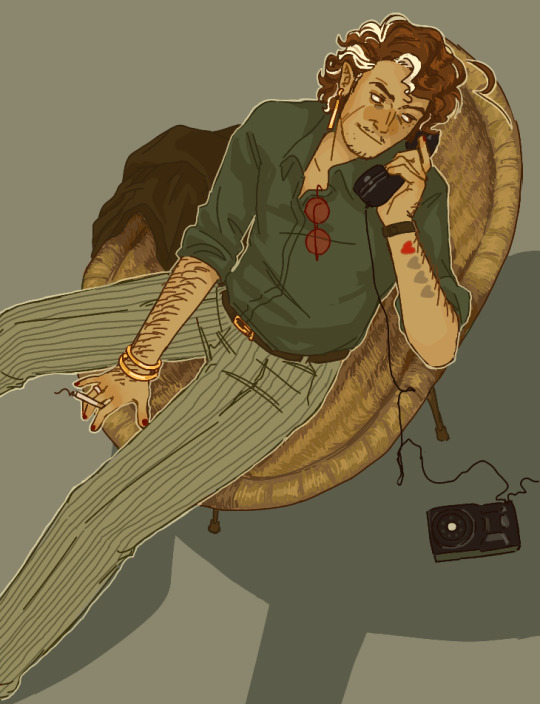
3 years and I'm STILL IN THE FUCKING BUILDING... unbelievable... anyway happy re-bday to my pathetic cringefail politician
Alt ver. under the cut
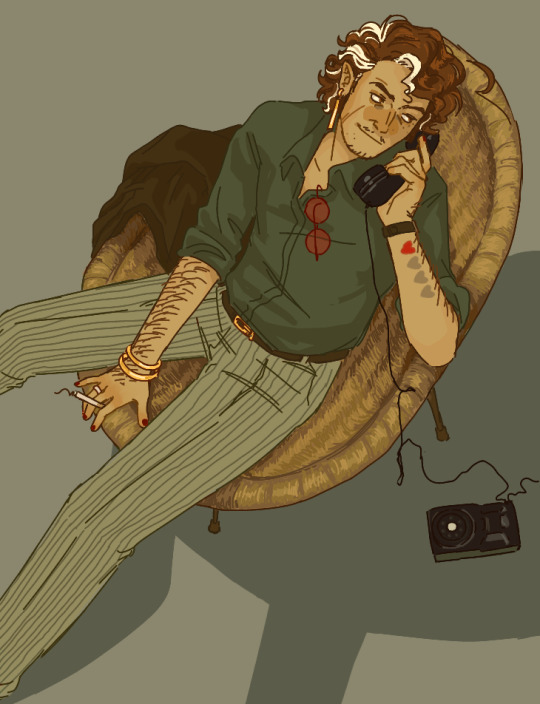
***Massive disclaimer: i do not support the cc this is strictly about the fictional character
#cwilbur#c!wilbur#dsmp fanart#my art#woah hi hello how's it going#still in this hellhole i couldn't claw my way out my fingernails are too short#still had to do smth for this guy i mean cmon. major influence over my life for years#speaking of which hey major redesign. you know why.#nothin much to say. random outfit. face based on gregory peck tho it's not rly clear here#lives tattoos i thought were fun. tried to make the revived life look like a shitty stick n poke dont know if that reads well#aro ring but on the wrong finger whoops. dont care enough to fix it#anyway hope you enjoy :p fangs for sticking around xoxo#OH and first time writing an image desc. hope it was good!! ik its like a mile long but idk how to be any more concise#fennec.art
388 notes
·
View notes
Text
Y are there still people who think Nickel and Suitcase need to talk 😔she's made it pretty clear she doesn't want anything to do with him
#they werent even close. whats done is done may they never interact ever again cuz they dont need to#I just cant imagine what purpose ppl think it wld serve. another speech abt how nickel is a shitty person ? I think we are aware of it😭#the way they confirmed shes not gunna forgive him was short on concise. I dont want anything more from them thank you!#she was never going to forgive him and thank god for it!#neos running out of inanimate insanity things to think abt LOL i need new content#inanimate insanity#talking
54 notes
·
View notes
Text
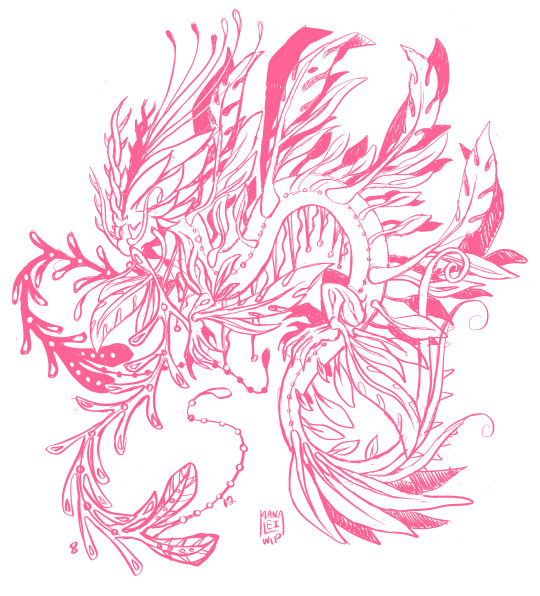
Guild Wars 2 OC stuff: So I finally figured out the full body design for Vallotash (Mordremoth's Scion a.k.a. who Mourynn actually is) They're more or less the same person, but it's complicated, but leans more to Vall believing she's Mourynn and kind of is since she inhabits her body and memories, but is technically an imposter and is very depressed and in denial about it. Inspiration from Jahai Bluffs: "Are you a dragon dreaming that it's a hero? If you were, how would you know?" (also it's my tumblr banner lol) I'm still sketching out the origin story to explain how this happens, but for now here is this sketch bc I am happy with how this turned out and wanted to post it early. It's basically self preservation turned to parasitism to accidental death of host to unintentional identity theft out of guilt/tribute + memory absorption to make her think she's the sapling + amnesia about the whole event taking place over the span of a year stuck in the dream (to super condense her origin lore). I'll finish these sketches once I'm done her origin story pages, or if I get possessed to do it earlier bc I'm still happy with how this turned out and might want to keep working on it sooner, hehe.
Here is more sketches of Mourynn/Vallotash under the cut:
She has some simpler looks for when she's flattened down. She looks SO SILLY but I love it. Beware the Scion of Mordremoth: This freaking wiggly silly noodle thing. A terrifying menace!! Beloathed parasite daughter vine of the mighty Jungle Elder Dragon!! /does a snake blep (Also the first two head sketches I did of her from last year when she still didn't have a body designed yet lmao. I still have to figure out how large she actually is, as well as her colouration. She'll have to match Mourynn's, so she's gonna be a funny mix of the colours in the cool spectrum, which doesn't look very plant-like, but sylvari can be all different colours, and she has the whole poisonous/hallucinogenic thing going on, as well as some Soo-won influence bc she's based off a leafy sea dragon and is very attuned to water, so it kinda works yeah????) I also have no idea what her large chin whisker things are supposed to be. I just kind of made them up on the spot and fell in love with them, so they're STAYING, even if they make no sense. I mostly just love that they'd look so cool underwater and while glowing in the dark, and they are vaguely alien and jellyfish-like.

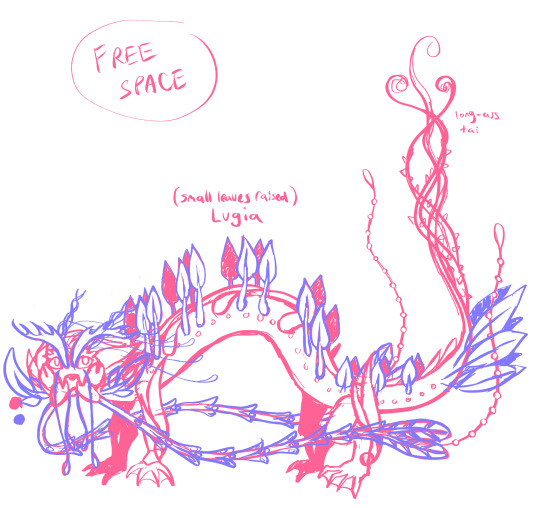

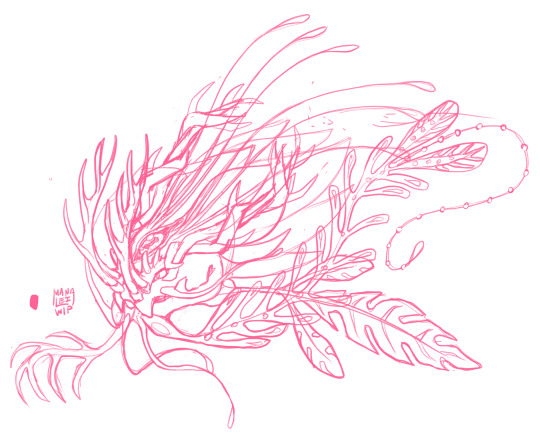

#wip gallery#gw2 OC#guild wars 2#sylvari OC#vallotash#mourynn#dragons#Making sure to keep gw2 visible in case this reaches outside my gw2 bubble; I don't want it labelled generic fantasy or D&D#also sorry i can never leave short concise descriptions lsjfaskf#i'm plagued with the fear of misunderstandings and have to over-explain everything out of paranoia#I'll still probably change/adjust a few things; but overall I like how funky and over the top ornate she looks#mostly bc i like to envision her being all weird and alien like underwater#and even while floating in the air/gliding it gives her a cool looking/elegant silhouette#also she can't fly!!! she can only swim; glide; and skim over water; but she's also a very good climber!!!#I also have to figure out a watermark for the final pieces; for now I have more earlier wips of these saved just in case
187 notes
·
View notes
Text
ok lol. so not content merely with the "👍" he gave me like 7 years ago when i came out as trans, today it's "cool. i have a number of poly friends".
20 notes
·
View notes
Note
I love your designs for Gracie, Jerry, and Yan! Could you talk more about your headcanons for them? Like the powers and personalities you mentioned?
*twirls hair* Why thank you hehe
My headcanons for them shift a bit from time to time as I change my mind very often so I apologize if they will make little sense (it's not like I ever had to use them for a fic anyway) but the general idea is that Jerry's main domain is knowledge, Gracie's is light and Yan's is truth? Maybe?
There's not much info a single line can give but Jerry gave me the impression of a very uh. Pragmatic kid, so to speak? In a group I think he's the person who gets everyone back on track. Maybe a bit of a know-it-all, likes to sound like he's learned every page of a dictionary front to back for fun. That naturally connects him to Apollo's domain of knowledge and I know it sounds lame because that would make him very similar to a child of Athena but also there can be some interesting ways to play with that concept
Power over knowledge would of course entail exceptional photographic memory and a knack for understanding complex concepts: he reads something once, instantly understands and memorizes it (if you're wondering if Mike Ross inspired this in any way then yes, he did). However, depending on how powerful he grows to be, I was thinking that it could make him have some power over someone's mind as well, maybe by letting him manipulate certain types of information in their minds or even just access it. I mean, one of the articles on ReadRiordan mentioned that as the Muse of history's son Hyacinthus had powers over people's memories/perception of things, so it doesn't seem to be too far-fetched to think that knowledge would entail something similar
A popular headcanon in the fandom is also that Jerry has power over prophecy to some degree, and that would ALSO be very intriguing, especially given the implications of Jerry being (at least among the canon characters) the first child of Apollo since Halcyon to have prophecy powers 👀 maybe in this scenario it could be some sort of secondary power that's a direct consequence of the first one? Maybe they could be connected? Not sure
On the contrary, Gracie to me is basically the complete opposite of him. She's way more open and carefree and gets side-tracked very very easily, and even though most of that naturally derives from her 7-year-oldness (because I cannot see her as anything but a 7 y/o tbh) I think it would stick with her even as she grows older. Light powers seem difficult to master and actually use in combat by virtue of how easily light scatters, so maybe they would be a good way for her to center herself and be more focused
I actually considered the possibility of her having powers that connected to Apollo's purification domain as well because it's never mentioned and it is, at least in theory, cool as hell as a power, but I fear it would only make sense in a pair—light as a tool for purification, for example. Warding off evil, neutralizing curses, that sort of thing. It could make her very susceptible to corruption that way, but it is what it is! Many powers have some sort of downside
Finally, as for Yan, they seem like someone who only talks when they feel like it or when they deem it necessary and is, as a result, very observant and a good listener. Part of being able to know when someone's lying is paying attention to the way they behave, what they say and how they say it, so powers over truth seemed like a good choice in this context. Yan would be able to unconsciously realize that someone's lying through their tone, and as they practice even single out the specific lie later on
That would probably require a very receptive inner ear so that would mean they'd have a second, lesser power then? A natural affinity for music for sure, though I'm not sure about the specific instrument they'd pick
Anyway this is pretty much all I have! Ofc it's all a bit up in the air and I was making this up as I went because an idea apparently doesn't always make sense in words on its own but hopefully it makes sense now <3
I can't exactly say I'm excited about the upcoming books as I used to be due to how some things were handled (in TSATS specifically) but if these three are there and we get even a crumb of additional information about them it will be enough for me even if it disproves all of this 😭🙏 I just want something solid to work with yk
#apologies for the long answer#i was planning to answer in three short paragraphs but i cannot shut up about things apparently#i was not graced with the gift of concision i fear#trials of apollo#toa#pjo#apollo#cabin 7#ask#lonely thoughts
23 notes
·
View notes
Text
some of you are confused under the post that shows astarion's date of birth and date of "death". so first of all, it's a fact that in dnd 5e elves do grow up the same way humans do. a 39 year old is still that age. he wouldn't look like a child or a teen! "not an adult elf" is not literally true. it's a social thing among elves. think about it... someone who is hundreds of years old would look at a 70 year old human/elf and think... that's a baby. they also view humans that way, but surely we don't think a 39 year old human is not mature. it is just a fantasy thing, it makes sense that if such old people existed they would view younger people this way. so "not an adult by elven standards" is simply because of how old elves view younger people, elves included. let's just clear that up.
Also this made you all wonder how he could have been a magistrate. He is from baldur's gate which is a mixed society, not a society of elves. I highly doubt baldurians have a rule that only hundred year olds are allowed positions of power. then humans could never have positions. in elven society they might not give such a position to a 39 year old because they respect their elders more. but there is no difference between 39 year old elf and 39 year human mentally. ofc he can legally have a position in a place like baldur's gate.
plus during early access, he had the noble background. Why are you so confused that he could be a magistrate at the age of 39? As if rich/noble families don't ever use their connections to help someone in the family get a high paying job. lol He wouldn't need to grind for hundreds of years.
(and one more thing... in the tags under that post I wrote that the rune for 6 and 9 are similar so there is a chance that the date of "death" is 30 years later... which would make him 69. but from what I have seen, others also translated the year as 1268 and not 1298. still, if he was 69 that would mean he was turned nearly 200 years ago, but not quite 200 which is what he says in most dialogues. but it doesn't even matter because 69 is still below 100. so we could have the same conversation... under 100 does not mean not an adult.)
#bg3#astarion#bg3 mine#my post#my posts#baldur's gate 3#I am begging you to understand that it's just a social thing...#yes he was tragically young ... too young to ''die''#but it's not weird that he had this type of job...#39 is still 39 lived years .... it's not like elves experience a different flow of time#lol#I tried to make this short and concise... this is the best I could achieve#because it seems I had to explain it at length and better... there are so many confused commenters under that post
235 notes
·
View notes
Text
gestures vaguely have been meaning to say i think the way the eng-speaking fandom approaches bsd's complex mentor-apprentice relationships and conversations on abuse comes from a very, very culturally western narrative on abuse (as opposed to how asagiri clearly writes from a different background. etc) which flattens what bsd is attempting to say in favor of what they would like to see, but— that would wrap into just saying, i think certain people have blindspots on the way that cultural differences influence+inform the foreign media they consume and that they should be examining that further.
#considers. maintags.#bungou stray dogs#this is saying a lot of nothing because i think it's nuanced (and that asagiri handles the topic of abuse w nuance+complexity regardless of#the cultural background that informs his writing)#and wanted to keep this concise + without ten thousand disclaimers abt not doing orientalism#but like the cultural aspect informing it is very real to me. gestures.#i can also elaborate if asked but. keeps this short for now.#kavi.txt
11 notes
·
View notes
Text
Fic rec
Vanilla Twilight (1700w, e) by Black_Calliope
“At times it hurts,” he whispers, so softly that it’s barely audible. And Danny watches him, imprints the shape of Steve’s lips in his memory as Steve says it, lets it pour out of him like one of those powerful torrential rains that usually precede the rainbow, words slowly dripping from his heart. “I love you so much that it hurts,” he says, forehead pressed against Danny’s.
It’s scary, the intensity of it, how Danny suddenly wants to guide one of Steve hands on his own neck, wants to feel strong fingers tightening around flesh, cutting his air, giving a new meaning to the word love as he knows it, so they can rebuild it together, shape it into something new and just theirs. “I know,” he exhales against Steve’s lips, wrecked. “I know.”
~~~~
this is one of my go-to rereads, a lovely little romp in the ocean, so beautifully and evocatively written, it's practically poetry in prose, painting vivid pictures and impressions, highly recommend this fic and this author, steve and danny's love for each other seeps through with every word (and it's also scorching hot 🔥).
#mcdanno#h50 fic rec#i had to include such a long quote because i believe it encapsulates the intensity of their feelings for each other#and i love it so#h50#love when authors convey so much in such short form#also deeply jealous because im extremely verbose myself and can't be concise to save my life#myh50#author rec#mcdanno fic rec#mcdanno on the beach#hawaii five 0#previous art manip reblog made me think of this fic
11 notes
·
View notes
Text
15 pages... I legitimately had to reduce the amount of data from 20 to 12. And it's still too long. At this rate I'm going to turn in a 20-pages long article and gaslight my professor into thinking she assigned us a maximum of 20 pages instead of 10. This is actually impossible for me. </3
Article yapping aside. AGH. CAN I JUST. OFFICIALLY COME BACK NOW. PLEASE. I WANT TO YAP. SO MANY THINGS TO YAP ABOUT. TR*YJ*D*....... 4 hours and 15 minutes left. I'll take off the chains at exactly 12 a.m. and nobody can stop me. Not even uni. YOU CAN'T TAKE THE BRAINROT AWAY, UNI...
#yapping toad#i still need to find a way to shorten this article#LORD i am not equipped for short and concise writing#IF I HADN'T REMOVED A LOT OF THINGS THIS ARTICLE WOULD PROBABLY BE SITTING AT 20 PAGES
8 notes
·
View notes
Text
I'm gonna make a sweeping assumption that Larian is only winning because people really want the air of BG3 romance routes in DA. I admittedly have come to the conclusion that I would be completely fine with DA that has no romances but improves on its worldbuilding and inner philosophy instead.
#🌞#ramblings#Remember when RPGs did not have romances at all... But they were still there in our minds...#I say that Larian is only winning because of romance stuff bc DnD-like mechanics are completely unsuitable for DragonAge.#(I like DA2 voice) I'm fine with a short game that has a concise plotline
7 notes
·
View notes
Note
Thoughts on how misogynistic catholicism is?
I'm not going to deny that there are definitely guys within the Catholic Church that hide their misogyny in the guise of "traditionalism." It's the result of the Fall and Original Sin; pride made them that way.
But the teachings of the Catholic Church, especially in banning pornography, elevates the status of women compare to the secular world. She's not just an object to be used for pleasure; she deserves to be respected because she's made in the image and likeness of God.
Men who calls them Catholic but fail to uphold this teaching by watching porn in close doors are not authentic Catholic.
The Catholic Church lists a bunch of female saints that the faithful can ask intercessory prayers from to help them live holy lives:
St. Joan of Arc
St. Catherine of Siena
St. Catherine of Alexandria
St. Therese de Lisieux
St. Teresa of Avila
St. Mary of Magdalene
That's all the saints that I can think of on the top of my head.
Also, we Catholics venerate the Blessed Virgin Mother Mary as the mother of God. We don't dismiss her role in salvation history by giving birth to Jesus Christ the Redeemer like other Christian sects do.
So no, the Catholic Church is not misogynistic.
If you have more specific questions, anon, feel free to ask.
#i think more can be said on this subject but i think concise and short is better because less is usually more#to encourage more discussion if anyone feels inclined#Catholic#Christianity#feminism#femininity#asks
87 notes
·
View notes